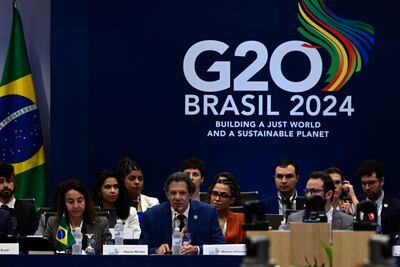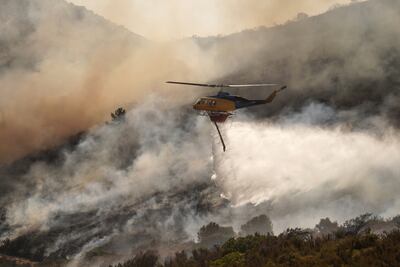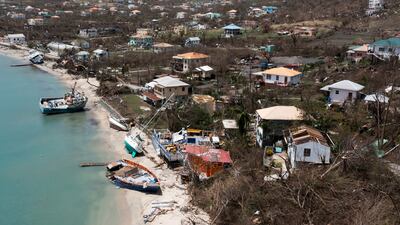Speaking from a devastated Grenada in the aftermath of Hurricane Beryl this month, the head of the UN Framework Convention on Climate Change laid bare the biggest obstacle facing climate frontline communities.
“Governments in these vulnerable, developing islands have such limited fiscal space. They’re heavily debt burdened. They don’t have the financial means to continue to borrow to rebuild what they have just rebuilt, only for it to be destroyed again,” Simon Stiell said in an emotional interview, as the small Caribbean island’s community struggles to pick up the pieces.
If ever there as a snapshot of the brutal socio-economic impact of climate change, it is this: peoples’ lives and livelihoods were swept away overnight.
And, as Mr Stiell pointed out, the impact of Hurricane Beryl also highlights the global climate fight’s biggest challenge: making finance accessible and affordable to vulnerable and emerging markets and developing economies – otherwise known as EMDEs.
The climate fight won’t make any headway if the global financial system isn’t reformed. Far too many low-income economies are imperilled by mounting debt, entrapped and forced to repay higher-interest loans on money borrowed to fight the consequences of increasing extreme weather events.
Finance holds the key to unlocking new, inclusive climate mitigation and adaptation solutions. It is rightly, therefore, at the top of the international community’s agenda this year.
Brazil, the G20 president, has pushed reform of the climate finance system hard. This was on display at the third G20 Finance Ministers and Central Bank Governors Meeting in Rio de Janeiro last week. The subsequent communique emphasised the group’s focus on “promoting effective policy frameworks and mobilising adequate, affordable and accessible finance to address climate change and biodiversity challenges”.
Importantly, the meeting also showed important signs of integration with the global climate action agenda laid out by the Cop28 UAE presidency, at the Cop28-G20 Conference on Sustainable Finance, held on the sidelines in Rio. At the conference, the UAE’s Minister of State for Financial Affairs, Mohamed Hadi Al Hussaini, called for an international framework that supports the distribution of finance in ways that mitigate investment risks in developing countries.
Hurricane Beryl highlights climate fight’s biggest challenge: making finance accessible and affordable to vulnerable countries
Given the fact that this year, the G20 Leaders’ Summit overlaps with the first days of Cop29 – when heads of state and government usually convene at the UN climate talks – a direct merging of agendas from the two influential bodies can be seen. In this sense, integration between these two bodies is both inevitable and important.
Much of the momentum behind the issue of climate finance was generated seven months ago, when Cop28 ushered in a new dawn for a practical, pragmatic approach to closing the climate finance gap and investing in an equitable energy transition that leaves no one behind.
As well as securing $85 billion in new commitments and replenishing the Green Climate Fund, Cop28 secured an agreement on a new Global Climate Finance Framework with 10 principles for closing the finance gap that the transition demands, which currently stands at about $7 trillion a year by 2050, according to data from the International Renewable Energy Agency.
Investing this $7 trillion annually to greenify the global economy and close the financing gap is not only critical to achieving our shared climate goals, it also presents an unprecedented opportunity to accelerate local, regional and global low-carbon, climate resilient, inclusive growth.
The good news is that climate finance is moving in the right direction. More than $1.7 trillion was invested in clean energy alone in 2023, which coincided with a 13.9 per cent growth in renewable energy power capacity, according to Irena.
The not-so-good news is that climate finance is not moving fast enough. Further delays are only exacerbating the urgency of future needs, with the annual sum of climate finance needed set to rise only if the shortfall persists.
This climate finance gap is felt especially acutely in EMDEs in the Global South. According to a report by the Independent High-level Expert Group on Climate Finance, $2.4 trillion worth of investment a year is needed in EMDEs by 2030 across the priorities of a just energy transition, adaptation and resilience, loss and damage, and the conservation and restoration of nature.
This figure represents a four-fold increase from current levels devoted to these areas. And, as the first Global Stocktake highlighted, climate investments and accessible finance in EMDEs are severely lacking.
Further, EMDEs are being left behind on clean energy. While clean energy investments hit an all-time global peak last year, more than 90 per cent of the increase in these investments since 2021 has taken place in the developed economies, and China. Low- and lower-middle income countries accounted for only 7 per cent of clean energy spending in 2022.
The challenges to overturning the climate finance status quo are clear. EMDEs face higher interest rates, impractical policy frameworks and market designs, and a higher cost of capital. The solutions should be just as clear.
Guided by international co-operation, we need to see an urgent scaling-up of climate finance that prioitises the needs of EMDEs with ready solutions to easing debt burdens. It is on these frontlines – the small islands, the developing states, the vulnerable and emerging economies – where the fight against climate change and the race to the energy transition will be won and lost.
Initiatives such as Irena’s Energy Transition Acceleration Financing Platform and Lives and Livelihoods seek to mobilise and redirect crucial finance to the parts of the world that need it the most. This is important to build and rebuild infrastructure; to support vital industries that frontline communities rely on, like food, agriculture, health care and education; and to build new energy capabilities so that no-one lives in the dark.
For finance to trickle down, however, the taps at the top need to be turned on. And a new financial architecture needs to be built so that capital flows quicker and easier.
The systemic nature of the climate crisis means that it can be tackled effectively only through expedient and efficient economy-wide reforms designed to deliver the quantity and quality of finance necessary for all communities to transition to climate resilience and safety.
The specs: 2019 Lincoln MKC
Price, base / as tested: Dh169,995 / Dh192,045
Engine: Turbocharged, 2.0-litre, in-line four-cylinder
Transmission: Six-speed automatic
Power: 253hp @ 5,500rpm
Torque: 389Nm @ 2,500rpm
Fuel economy, combined: 10.7L / 100km
How Apple's credit card works
The Apple Card looks different from a traditional credit card — there's no number on the front and the users' name is etched in metal. The card expands the company's digital Apple Pay services, marrying the physical card to a virtual one and integrating both with the iPhone. Its attributes include quick sign-up, elimination of most fees, strong security protections and cash back.
What does it cost?
Apple says there are no fees associated with the card. That means no late fee, no annual fee, no international fee and no over-the-limit fees. It also said it aims to have among the lowest interest rates in the industry. Users must have an iPhone to use the card, which comes at a cost. But they will earn cash back on their purchases — 3 per cent on Apple purchases, 2 per cent on those with the virtual card and 1 per cent with the physical card. Apple says it is the only card to provide those rewards in real time, so that cash earned can be used immediately.
What will the interest rate be?
The card doesn't come out until summer but Apple has said that as of March, the variable annual percentage rate on the card could be anywhere from 13.24 per cent to 24.24 per cent based on creditworthiness. That's in line with the rest of the market, according to analysts
What about security?
The physical card has no numbers so purchases are made with the embedded chip and the digital version lives in your Apple Wallet on your phone, where it's protected by fingerprints or facial recognition. That means that even if someone steals your phone, they won't be able to use the card to buy things.
Is it easy to use?
Apple says users will be able to sign up for the card in the Wallet app on their iPhone and begin using it almost immediately. It also tracks spending on the phone in a more user-friendly format, eliminating some of the gibberish that fills a traditional credit card statement. Plus it includes some budgeting tools, such as tracking spending and providing estimates of how much interest could be charged on a purchase to help people make an informed decision.
* Associated Press
The specs
Price, base / as tested Dh135,000
Engine 1.6L turbo
Gearbox Six speed automatic with manual and sports mode
Power 165hp @ 6,000rpm
Torque 240Nm @ 1,400rpm 0-100kph: 9.2 seconds
Top speed 420 kph (governed)
Fuel economy, combined 35.2L / 100km (est)
88 Video's most popular rentals
Avengers 3: Infinity War: an American superhero film released in 2018 and based on the Marvel Comics story.
Sholay: a 1975 Indian action-adventure film. It follows the adventures of two criminals hired by police to catch a vagabond. The film was panned on release but is now considered a classic.
Lucifer: is a 2019 Malayalam-language action film. It dives into the gritty world of Kerala’s politics and has become one of the highest-grossing Malayalam films of all time.
Volunteers offer workers a lifeline
Community volunteers have swung into action delivering food packages and toiletries to the men.
When provisions are distributed, the men line up in long queues for packets of rice, flour, sugar, salt, pulses, milk, biscuits, shaving kits, soap and telecom cards.
Volunteers from St Mary’s Catholic Church said some workers came to the church to pray for their families and ask for assistance.
Boxes packed with essential food items were distributed to workers in the Dubai Investments Park and Ras Al Khaimah camps last week. Workers at the Sonapur camp asked for Dh1,600 towards their gas bill.
“Especially in this year of tolerance we consider ourselves privileged to be able to lend a helping hand to our needy brothers in the Actco camp," Father Lennie Connully, parish priest of St Mary’s.
Workers spoke of their helplessness, seeing children’s marriages cancelled because of lack of money going home. Others told of their misery of being unable to return home when a parent died.
“More than daily food, they are worried about not sending money home for their family,” said Kusum Dutta, a volunteer who works with the Indian consulate.
Five ways to get fit like Craig David (we tried for seven but ran out of time)
Start the week as you mean to go on. So get your training on strong on a Monday.
Train hard, but don’t take it all so seriously that it gets to the point where you’re not having fun and enjoying your friends and your family and going out for nice meals and doing that stuff.
Think about what you’re training or eating a certain way for — don’t, for example, get a six-pack to impress somebody else or lose weight to conform to society’s norms. It’s all nonsense.
Get your priorities right.
And last but not least, you should always, always chill on Sundays.
Neil Thomson – THE BIO
Family: I am happily married to my wife Liz and we have two children together.
Favourite music: Rock music. I started at a young age due to my father’s influence. He played in an Indian rock band The Flintstones who were once asked by Apple Records to fly over to England to perform there.
Favourite book: I constantly find myself reading The Bible.
Favourite film: The Greatest Showman.
Favourite holiday destination: I love visiting Melbourne as I have family there and it’s a wonderful place. New York at Christmas is also magical.
Favourite food: I went to boarding school so I like any cuisine really.
Januzaj's club record
Manchester United 50 appearances, 5 goals
Borussia Dortmund (loan) 6 appearances, 0 goals
Sunderland (loan) 25 appearances, 0 goals
Dunki
%3Cp%3E%3Cstrong%3EDirector%3A%3C%2Fstrong%3E%20Rajkumar%20Hirani%C2%A0%3C%2Fp%3E%0A%3Cp%3E%3Cstrong%3EStarring%3A%3C%2Fstrong%3E%20Shah%20Rukh%20Khan%2C%20Taapsee%20Pannu%2C%20Vikram%20Kochhar%20and%20Anil%20Grover%3C%2Fp%3E%0A%3Cp%3E%3Cstrong%3ERating%3A%3C%2Fstrong%3E%204%2F5%3C%2Fp%3E%0A
UAE currency: the story behind the money in your pockets
Various Artists
Habibi Funk: An Eclectic Selection Of Music From The Arab World (Habibi Funk)
Dr Amal Khalid Alias revealed a recent case of a woman with daughters, who specifically wanted a boy.
A semen analysis of the father showed abnormal sperm so the couple required IVF.
Out of 21 eggs collected, six were unused leaving 15 suitable for IVF.
A specific procedure was used, called intracytoplasmic sperm injection where a single sperm cell is inserted into the egg.
On day three of the process, 14 embryos were biopsied for gender selection.
The next day, a pre-implantation genetic report revealed four normal male embryos, three female and seven abnormal samples.
Day five of the treatment saw two male embryos transferred to the patient.
The woman recorded a positive pregnancy test two weeks later.
How to wear a kandura
Dos
- Wear the right fabric for the right season and occasion
- Always ask for the dress code if you don’t know
- Wear a white kandura, white ghutra / shemagh (headwear) and black shoes for work
- Wear 100 per cent cotton under the kandura as most fabrics are polyester
Don’ts
- Wear hamdania for work, always wear a ghutra and agal
- Buy a kandura only based on how it feels; ask questions about the fabric and understand what you are buying
WITHIN%20SAND
%3Cp%3EDirector%3A%20Moe%20Alatawi%3C%2Fp%3E%0A%3Cp%3EStarring%3A%20Ra%E2%80%99ed%20Alshammari%2C%20Adwa%20Fahd%2C%20Muhand%20Alsaleh%3C%2Fp%3E%0A%3Cp%3ERating%3A%203%2F5%3C%2Fp%3E%0A
At a glance
Global events: Much of the UK’s economic woes were blamed on “increased global uncertainty”, which can be interpreted as the economic impact of the Ukraine war and the uncertainty over Donald Trump’s tariffs.
Growth forecasts: Cut for 2025 from 2 per cent to 1 per cent. The OBR watchdog also estimated inflation will average 3.2 per cent this year
Welfare: Universal credit health element cut by 50 per cent and frozen for new claimants, building on cuts to the disability and incapacity bill set out earlier this month
Spending cuts: Overall day-to day-spending across government cut by £6.1bn in 2029-30
Tax evasion: Steps to crack down on tax evasion to raise “£6.5bn per year” for the public purse
Defence: New high-tech weaponry, upgrading HM Naval Base in Portsmouth
Housing: Housebuilding to reach its highest in 40 years, with planning reforms helping generate an extra £3.4bn for public finances




